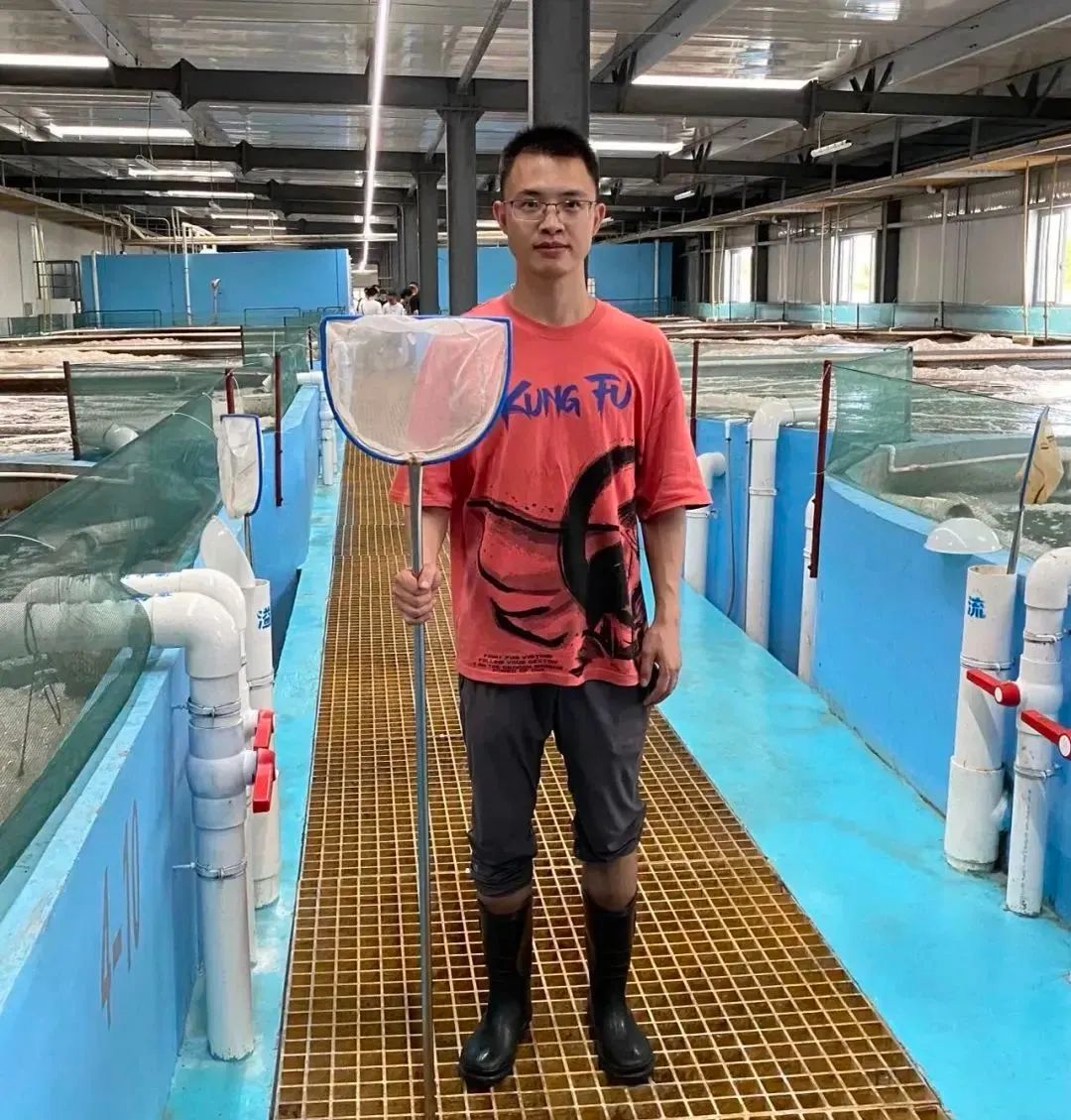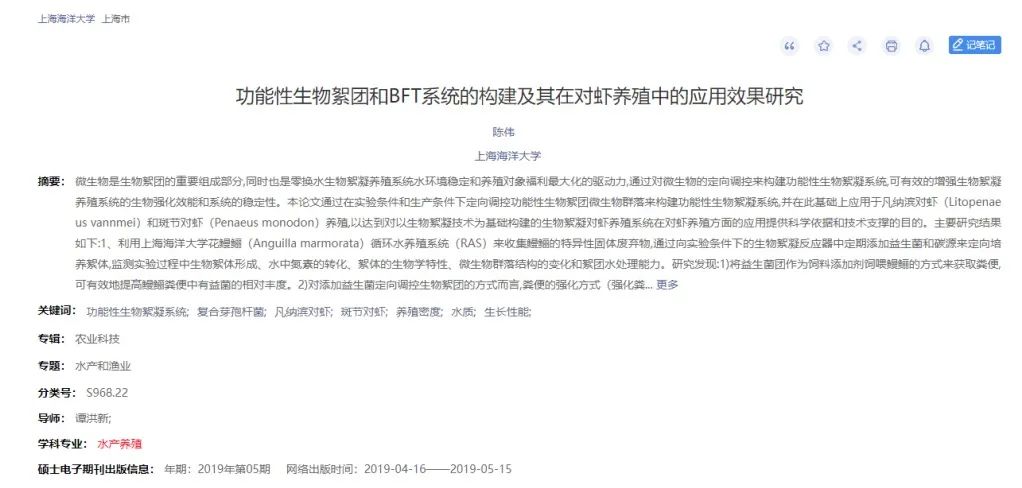"Double first -class" graduated for 3 years, he turned the paper into reality
Author:Scientific network Time:2022.08.07
Text | "China Science News" reporter Shen Chunlei
Sea white shrimp, also known as South White Plack, usually breeds life in the sea. If you raise sea shrimp in the inland areas without sea water, it seems a little whimsical.
Chen Wei, who graduated from Shanghai Ocean University, proposed a "land -based shrimp" method in a master's paper. After more than 3 years of research and practice, he finally turned the paper into reality.
In July of this year, a group of special South White Plants went public. Different from the traditional seawater shrimp, during the entire breeding process of these shrimp, the water consumption is only 1/10 of the traditional breeding. There are only 5 core technical teams behind this, and Chen Wei is one of them.
A few days ago, the "China Science News" interviewed Tan Hongxin, his mentor and his instructor, Dean of the School of Aquatic and Life of Shanghai Ocean University, and asked them how to achieve "land -raising".

Chen Wei
From the mountains to the ocean, he turns the graduation thesis into reality
Chen Wei studied at Shanghai Ocean University's marine biological resources. Why should he choose to apply for marine majors from Dashan? What about the breeding major when you are studying for a master's degree?
"The 21st century is the century of the ocean. I am full of longing for the ocean. This is why the undergraduate applies for the Ocean Academy." Chen Wei told the China Science News, "After studying the professional knowledge of 4 years, I hope to do my best Make changes, so I chose a breeding major.
It is better to grant people to fish. In the future, the aquaculture system can ensure people's health and sustainable protein sources. For Chen Wei, the changes brought by across majors are not too large, but they are replaced from basic life research to circular aquaculture technology research and engineering applications.
In 2015, Chen Wei took Tan Hongxin's graduate student and became a master's degree in circulating aquaculture technology and system engineering laboratory.
In addition to studying at school in the first year of graduate students, Chen Wei spent at the breeding base in the next two years. Through the study practice of graduate courses, Chen Wei felt the difficulty of doing agriculture again.
He introduced shrimp farming as an example. Traditional soil pond shrimp production is backward and limited; the breeding environment is open, the success rate and survival rate are low; The cost of breeding in winter is high, and the market is in short supply.
Chen Wei's research direction is the shrimp raising of the biological flocculation system. His master's graduation thesis title is "Construction of Functional Bioccoencies and his Research on Application Effects in Shrimp Culture." He introduced to the "China Science News": "The biological flocculation can provide water treatment solutions for shrimp farming. There are many advantages, such as purifying water quality, providing food sources for shrimp, and improving immunity."
After graduation, Chen Wei's team used the biochemical system to realize land shrimp and turn the graduation thesis into reality.
In this regard, Tan Hongxin's evaluation is: "Biocheng masses should maintain the stability of the breeding system, and the technical personnel need to have systemic thinking ability to maintain the stability of the breeding system. The result of optimization. "

Starting from the source, the technical difficulty of conquering land shrimp farming is overwhelming
In addition to the advantages, there are also defects of shrimp maintenance of biological flocculation. Chen Wei told the Journal of China: "During the entire technology research and development and testing stage, the biggest difficulty we encountered is the control of the disease."
He further explained that once he encounters the disease, the biological flocculation will become a disease carrier and even amplify the disease. Therefore, it is necessary to control the disease from the source.
At the shrimp farming base, the first important job of Chen Wei's team is the screening and testing of shrimp seedlings. The shrimp seedlings of the base generally come from the large -scale seedlings with quality assurance. On the day of the shrimp seedlings entering the base, the team of Chen Wei will conduct self -examination of shrimp seedlings and conduct two tests before forming the breeding system to ensure that it is not sick.
Such a self -testing and testing cycle generally requires 28 to 30 days. Why do you do so much test? Chen Wei said: "Although each test is cost, if a few viruses are carried with viruses, and let it enter the development stage, because the breeding water is used inside the workshop, some discharged farming tail water passes through 'manual artificially manually. After the wetland technology is processed, the reckless use of tail water will not only occur in the risk of cross infection, but also may cause the collapse of the entire breeding system to crash and the loss is very large. "
In the process of testing in the middle of 2020, Chen Wei's team encountered shrimp seedlings. The system restarted for about a month. This made Chen Wei impress and increased the control of the source.
"We must pursue industrialized farming with high -tech content." Chen Wei has never forgotten the instructions of tutor Tan Hongxin.
How can we raise seedlings and shrimp? South whitening shrimp generally experienced 150-180 days to reach the breeding stage. In order to fully understand and understand the growth of shrimp, Chen Wei systematically carried out the system of shrimp breeding, young sports seedlings, small seedlings, youth shrimp management and prawn breeding. Sexual practice and exploration.
Chen Wei and the team created the best growth environment for the South whitening pairs of South whitening pairs of each growth stage, and established daily production databases and analysis platforms. Using the platform's data accumulation capabilities and visual analysis capabilities, the team finally formulated the best breeding solution Plan and standard procedures.
Because the breeding base belongs to the freshwater area, the "half -salt water" of the breeding of the breeding of Chen Wei's team is made of a certain proportion of freshwater and salt halogen, or the artificial seawater deployed through the seawater formula creates the basic conditions for breeding.
He said that in the future, this technical system is expected to be replicated and promoted in inland areas. Chen Wei and colleagues observe the behavior of shrimp with underwater robots

Application, "new farmers" futures are available
According to the results of the fourth discipline assessment, Shanghai Ocean University's aquatic disciplines are ranked A+, and Shanghai Ocean University Aquatic Discipline is also shortlisted for the "double first -class" discipline.
Tan Hongxin introduced the whereabouts of the graduates of the aquatic specialty to the "China Science News". Among them, the domestic enrollment rate of undergraduate graduates is about 45%, about 10%of graduates who go abroad, and about 30%of the remaining graduates enter the industry head Enterprises, about 10%will choose to switch; the graduate graduates' entry rate is about 15%, and about 50%of the remaining graduates enter the industry head enterprises, and some choose to test civil servants and join the "three branches and one support".
"Although we are majoring in agriculture, graduates are very good for employment and further studies." Tan Hongxin said, "In the future, agricultural development must take the road to improve quality and efficiency. Talents like Chen Wei. "
At the beginning of the school gate, Chen Wei entered a leading enterprise in the industry. Talking about why he chose "farming", Chen Wei told the China Science Journal: "I am from the countryside, and I may have to return to the countryside in the future. Since I have learned a breeding major, I still hope to use what I have learned. Note. "
Today, the post -90s and post -00s have been engaged in agriculture, and the development of agricultural development is facing the status quo of the shortage of new forces. Chen Wei called for more new forces to join agriculture and gain a sense of belonging and honor in the development of agricultural development.
"Our current industrial shrimp farming belongs to the category of facility agriculture, and is a typical 'new agriculture'." Chen Wei hopes to continue to improve the level of craftsmanship in the second phase of the test, and make the shrimp breeding stable and high yield. After maturity, our breeding system can be set in the country to provide new breeding solutions for the industry. In the future, we can also provide the scarce inland inland and the northern region to bring healthier, high -quality, cheap live shrimp. "
Edit | Fangyuan
Capture | Zhihai

Cooperation: [email protected]
Submission: [email protected]
Like this article? Praise + watch support!


- END -
Wuhan University full -time general undergraduate enrollment charter (revised in 2022)
Chapter 1 General PrinciplesArticle 1 In accordance with the relevant provisions of the Ministry of Education and Education Law of the People's Republic of China, The People's Republic of China, and...
Guard the childlike heart, build a dream forward

The stars in the sky are facing Beidou, and the sunflowers on the ground are to th...